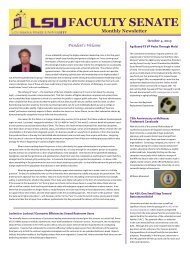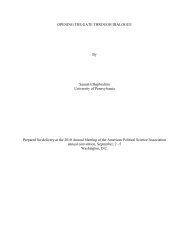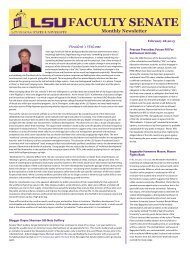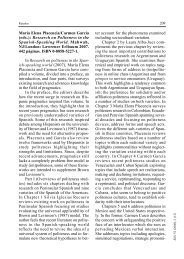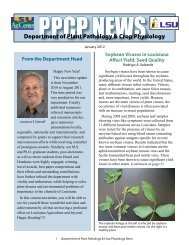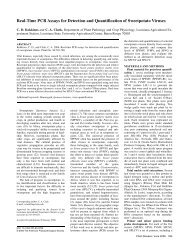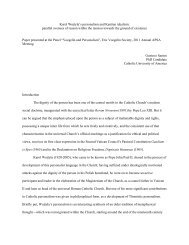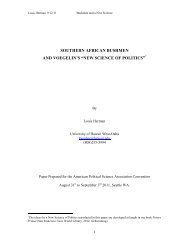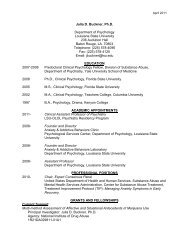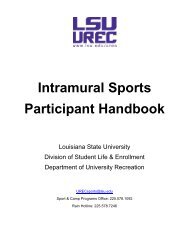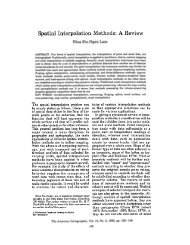Nicoletta Stradaioli, University of Perugia - Louisiana State University
Nicoletta Stradaioli, University of Perugia - Louisiana State University
Nicoletta Stradaioli, University of Perugia - Louisiana State University
Create successful ePaper yourself
Turn your PDF publications into a flip-book with our unique Google optimized e-Paper software.
their origin in a particular social body. But such a social body is itself merely the embodiment <strong>of</strong><br />
intellectual formations held together by traits peculiar to the form. 2<br />
Voegelin argues that the “form” <strong>of</strong> a society had to be based on the interrelationship<br />
<strong>of</strong> various mental expressions (philosophy, economy, law, etc.) that led to a same model<br />
which binds the entire social order into a unity. Therefore, instead <strong>of</strong> identifying the <strong>State</strong><br />
with the monarch or law with the Grundnorm, Voegelin refers to the intellectual formations<br />
which are at the root <strong>of</strong> the political organization. 3 To grasp society in all its richness it is<br />
necessary to focus on the self-reflection <strong>of</strong> society. According to Voegelin:<br />
[…] what is it we want to know when we look into a national mind and try to understand it? We<br />
want to know the nation’s attitude toward the essential questions <strong>of</strong> life […]. We want to know<br />
what it considers a valuable aim to pursue in life, its attitude toward death and God, its ideal <strong>of</strong><br />
humanity, its ideas about social relations within the body politic, about relations to other national<br />
units, its belief in its mission in history, what it thinks <strong>of</strong> itself. A scientifically worked out concept<br />
<strong>of</strong> a national mind has to answer these questions, […]. 4<br />
Thus, the (political) scientist must begin his investigation from the interpretation <strong>of</strong><br />
the inherent meaning <strong>of</strong> the material that he wants to study. He proceeds grasping from<br />
history the morphology <strong>of</strong> the national type <strong>of</strong> mind. As a matter <strong>of</strong> fact, the national type<br />
<strong>of</strong> mind is brought into existence by history itself. Thus, investigation has an empirical-<br />
experiential basis: the analysis <strong>of</strong> the intellectual formation is tied to personal and social or<br />
institutional expressions <strong>of</strong> mind which have an experiential foundation.<br />
In this respect, common sense is at the base <strong>of</strong> the American type <strong>of</strong> mind. According<br />
to Voegelin, the intellectual and political life <strong>of</strong> the United <strong>State</strong>s is not founded on a rigid<br />
doctrinal system, it was inspired by concrete political events which constitute the basis <strong>of</strong><br />
political life, such as the founding <strong>of</strong> the American Republic, the Declaration <strong>of</strong><br />
Independence and the adoption <strong>of</strong> the Constitution. An immediate perception, an original<br />
trust/belief in the historical roots <strong>of</strong> the basic principles <strong>of</strong> the democratic community<br />
prevail in the social and political scene. From Voegelin’s perspective, the political<br />
2<br />
E. VOEGELIN, On the Form <strong>of</strong> the American Mind, Baton Rouge and London, <strong>Louisiana</strong> <strong>State</strong> <strong>University</strong><br />
Press, 1995, pp. 5-6.<br />
3<br />
In The New Science <strong>of</strong> Politics Voegelin speaks <strong>of</strong> existential representation.<br />
4<br />
E. VOEGELIN, National Types <strong>of</strong> Mind and the Limits to Interstate Relations, in E. VOEGELIN, The Theory<br />
<strong>of</strong> Governance and Other Miscellaneous Papers 1921-1938, Columbia and London, <strong>University</strong> <strong>of</strong> Missouri<br />
Press, 2003, pp. 447-448.<br />
4



